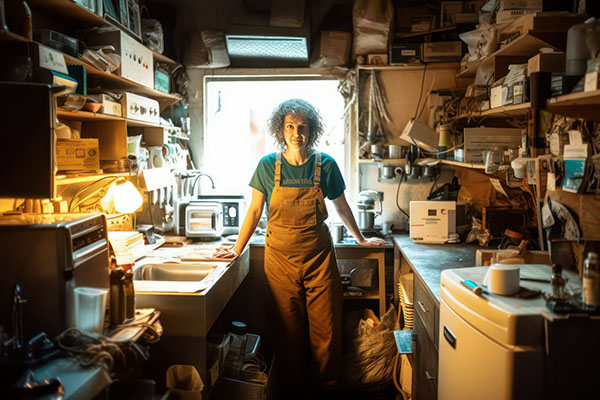A Prepping Reality Check – Part 2
by Mama Bear, Survival Blog:

Now that you have decided on a physical location that provides the best probability of survival for you and your family, let’s look at the next stage.
FOOD PRODUCTION
- Do you plant a garden each year? If not, why not?
- When you plant your garden each year, where does your seed come from?
- If you are ordering seed each year from a catalog or internet or purchasing seed at a local store, how are you going to plant your garden when that is not available?
- If you are raising hybrid or GMO varieties, how will you save seed for the next season since these vegetable types will not breed true?
- If you use a tractor or tiller, where will you obtain fuel to run the equipment?
- How do you water/irrigate your garden?
- Where does this water come from and will it still be available during TEOTWAWKI?
- How will you fertilize and with what?
- How will you preserve and store what you harvest?
- What will you do if a third party comes to confiscate your harvest?
Personally, I purchase and grow only open pollinated varieties from which I can save seed. This also decreases the amount of money I need each year to plant the garden. And this past winter, I had fresh tomatoes for salads through December in my greenhouse. The savings I put into purchasing orchard and vineyard plants. I use raised beds and no till gardening with drip line for irrigation from the well run by solar. No fossil fuels needed and maximum water conservation.
Grains will be an issue for most after the first year. If you have a year’s supply of wheat then if society is not back together what will you do when that runs out. Having seed to grow wheat and other grains is a start. However, grains are extremely labor intensive without power equipment. Anthropologists estimate a stable community of approximately forty people in order to have enough labor to plant, grow and harvest the grain necessary to keep them fed.
Once you have planned to provide for vegetables and hopefully, fruit, then there must be provision for protein/meat.
- Can you set a snare?
- Can you trap?
- Do you have supplies to set snares and traps?
- If you do not have livestock, why not?
- What are the rules/regulations/zoning regarding livestock at your location?
- If you intend to hunt and live off wild meat, how long do you think that will last when everyone in the area is doing the same thing?
- If you are sheltering in place and are prohibited from having livestock, consider having rabbits which can be easily kept in a garage, basement or spare room.
- What about putting up shelters which can be used for shade until TEOTWAWKI and then converted to livestock shelters for the animals acquired through purchase or barter after the SHTF?
- How will you feed the livestock?
- How will you provide water?
- If you are able to grow feed for livestock, how will you harvest or store the feed through the winter?
- How will you protect the livestock from predators, both four legged and two legged?
- Have you ever hunted?
- Have you ever butchered an animal?
- What will you do with the offal, hide, horns, etc.?
- Do you have plenty of beans or other alternative protein sources?
Most areas will be hunted out within 3-4 months or less. If you do not have livestock, consider rabbits, chickens, and hogs as your first purchases. Rabbits, chickens and hogs can be fed with scraps from the garden and kitchen with some hand harvested grass for the rabbits and hogs. Remember that breeding pairs will be necessary in order to have a sustainable meat harvest over several years. When acquiring livestock, look at whether you will be able to breed them locally (within walking distance) if you do not acquire breeding pairs. Also plan for the ability to feed them with forage or grain. It also may be possible, if you do not want to have livestock, to arrange a barter agreement with a neighbor who does have livestock to provide garden stuffs, labor, or security in exchange for meat.
POWER
Another critical area to assess is power. If you are connected to the grid, your power supply is toast. If you have a grid-tied solar system you will need to find out which type of grid-tie you have. In grid-tied systems, the power that is generated from your solar system flows out to the grid and then the grid supplies you with power. If you do not have a switch installed to disconnect from the grid and directly supply your home with the power from your solar system, then when the grid goes down, so do you. This is an extra expense for a grid-tied system but well worth it.
For anyone who doubts the inevitability of grid-down in this country, I recommend the book Lights Out by Ted Koppel. This is a well-researched book on the state of the power industry in North America and its vulnerability.
For an independent solar system, ask yourself:
- When is the last time your batteries were replaced?
- How often do you have to replace your batteries? If your batteries normally last five years and the SHTF when your batteries are 4 ½ years old, then what will you do when the batteries die in 6 months?
- What will you do if after TEOTWAWKI the charge controller or inverter malfunctions?
- What if the solar panels or wind turbine are damaged in a storm?
For any power system:
- How much power do you actually NEED?
- Can you pitch the microwave, the automatic coffeemaker, the television, the DVD player, the computer, the video games, the incandescent lights left on throughout the house and the many other superfluous gadgets through your home?
- How much meat is in your freezer and how will you keep it when you no longer have power for the freezer?
- How long will the fuel supply for your generator actually last?
- What will you do when there is no more fuel for the generator?
- What if the generator malfunctions?
- Where will you obtain spare parts?
- How many of the electronics in your home will survive a power surge from an EMP or the malfunctioning of the grid?
- Can you live without your phone?
I know one family that has five (count ‘em – five) freezers of meat. They are preppers. I asked how they would maintain this without the grid. They responded that they have a generator and 500 gallons of fuel for the generator. This generator uses approximately 10 gallons of fuel per day. They can then run the freezers for at most two months. After that, the freezers are useless. I asked if they had jars for pressuring canning the meat and they do not. So after two months, any meat in the freezers that they have not eaten will be wasted without any way to preserve it.
Loading...



